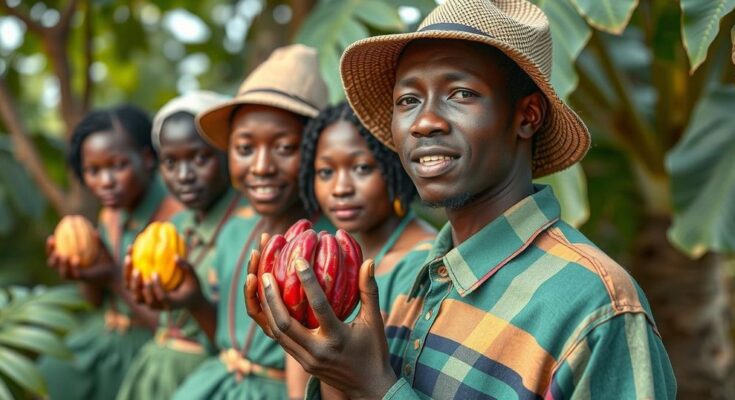Ghana’s cocoa industry is in crisis due to climate change and rising production costs, leading to declining yields and soaring global cocoa prices. Farmers face increased pest outbreaks and challenges, including those exacerbated by geopolitical factors. With elections approaching, candidates’ commitments to support cocoa farming are under scrutiny, alongside the urgent need for sustainable practices to ensure the industry’s future.
The cocoa industry in Ghana is facing significant challenges due to climate change, as evidenced by the experiences of farmers like Kate Buadu, who have seen their yields drastically decline. Ghana, the second-largest cocoa producer globally, has been hit by changing weather patterns that worsen pest and disease outbreaks, leading to a plummet in production to under 430,000 tons—a stark contrast to its usual output. As farmers struggle with increased costs, reduced harvests, and low-quality yields, global cocoa prices have surged, burdening both consumers and producers.
Farmers like Akua Donkor express frustration over the ineffectiveness of traditional pest control methods, coupled with the physical toll their work takes at an advanced age. Moreover, women face disproportionate barriers such as limited access to essential farming resources. International factors have also played a role in escalating costs, particularly through the disruption of fertilizer exports from Ukraine, further straining Ghanaian cocoa yields. Meanwhile, cocoa merchants report a severe reduction in the volume of beans available for purchase due to these declining production levels, prompting some farmers to abandon cocoa altogether in favor of more stable crops.
The chocolate industry feels the pinch, with companies facing dramatically increased costs for cocoa beans, leading to higher prices for consumers. In light of these pressing issues, civil society organizations are urging the adoption of sustainable practices to mitigate climate impacts while the government’s modernization efforts are viewed as insufficient by many farmers. Upcoming presidential elections have prompted farmers to assess candidates’ commitments to supporting cocoa production amid these challenges.
Experts emphasize the need for comprehensive solutions addressing deforestation and soil degradation to protect cocoa yields. For Ghana’s cocoa sector, which underpins the nation’s economy, sustainable practices and government intervention are seen as critical to reversing the current crisis and ensuring the longevity of this vital agricultural industry.
Ghana is a leading player in the global cocoa market, supplying a significant portion of the world’s cocoa alongside Ivory Coast. The cocoa sector not only serves as a cornerstone of Ghana’s economy, contributing over 10% to its GDP, but also employs more than 1 million farmers. However, recent climatic changes have severely impacted production capabilities, leading to sustained lower yields for multiple years, escalating prices, and threatening the livelihoods of countless families involved in cocoa farming. As Ghana enters a pivotal election, the focus on climate adaptation and support for farmers is more pressing than ever, with calls for both government action and private sector involvement in fostering sustainable practices.
In summary, Ghana’s cocoa farmers are grappling with the severe repercussions of climate change, leading to reduced yields and increased costs. With the upcoming elections, farmers are keenly aware of candidates’ pledges to support the agriculture sector. As the cocoa industry struggles with rising global prices and declining production, vital interventions are necessary to sustain this essential sector. The emphasis on integrating sustainable practices and addressing underlying issues related to climate change will be crucial for the future of Ghana’s cocoa industry and its farmers.
Original Source: theworld.org




